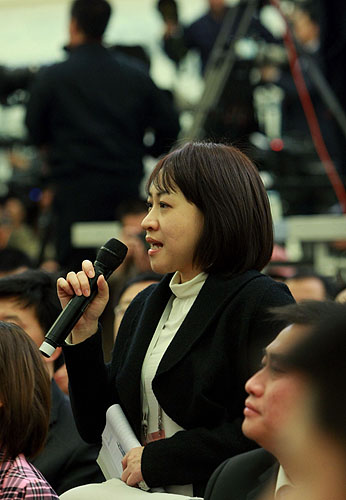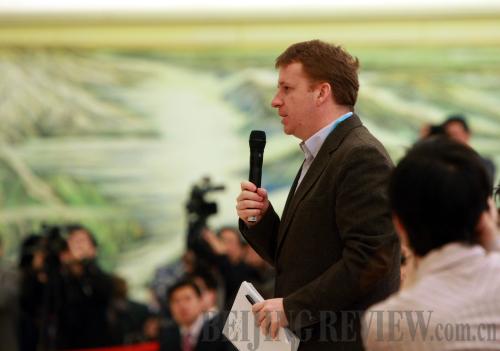|
 |
|
CHINA'S VOICE: Premier Wen tells the press conference on March 14 that the stable renminbi has played an important role in helping the world economy recover from the worst financial crisis in decades (CHEN JIANLI) |
On March 14, Premier Wen Jiabao addressed the Chinese and foreign media at a press conference after the closing meeting of the Third Session of the 11th National People's Congress. Edited highlights on a number of economic and social issues follow:
Renminbi stability
The renminbi has remained all but stable and has not been undervalued—a development best explained by examining trade figures.
Among China's 37 major trade partners, 16 saw an increase in exports to China last year. The European Union, with its total exports plummeting 20.3 percent, reported a 15.3-percent decline in exports to China.Germany, for example, witnessed its China-bound exports hit a record high of 76 billion euros last year. Meanwhile, exports of the United States plunged a hefty 17 percent in 2009, far sharper than a 0.22-percent drop in its exports to China.
 |
| JOINING HANDS: A reporter from the Taiwan-based United Daily News asks about economic cooperation across the Taiwan Straits (JIANG XIAOYING) | China has become a major market for exports from its neighboring countries, including Japan and the Republic of Korea, as well as Europe and the United States.
The stable renminbi has also played an important role in helping the world economy recover from the worst financial crisis in decades.
Since July 2005 when China began its currency reform to unpeg the renminbi against the U.S. dollar, the renminbi has appreciated 21 percent against the U.S. dollar, or 16 percent in real terms. But from July 2008 to February 2009, the most trying time for the global economy, the renminbi did not lose its value, but appreciated in real terms by 14.5 percent. During this period, China's exports sank 16 percent but imports only dropped 11 percent, resulting in a $102-billion decrease in trade surplus.
 |
|
STABLE YUAN: A reporter from the Financial Times asks Premier Wen about China's stance on the renminbi exchange rate (JIANG XIAOYING) |
A country's exchange rate depends on its national economy and economic situation. China stands for free trade as it not only keeps economy flowing, but also brings harmony and peace to the people. Also, China opposes accusations and even forceful measures that press the renminbi to appreciate, which will impede the exchange rate reform.
Finally, China will further improve the renminbi exchange rate formation mechanism and keep the rate basically stable at a reasonable and balanced level.
Financial situation
Despite some signs of recovery, dark times lay ahead for the world economy. Acute unemployment still plagues many major economic powers, while sovereign debt risks, not to mention volatile commodity prices and exchange rates of major currencies, stand to bring other countries to their knees. Meanwhile, inflationary expectations are proliferating in many countries, leaving policymakers with the predicament of determining an appropriate time to cease their massive stimulus plans.
Without a vibrant world economy, China cannot sustain recovery on its own. Many Chinese enterprises, for instance, have yet to experience a substantial turnaround and still rely heavily on government support.
 |
|
SINO-U.S. TIES: A reporter with the Agence France Presse asks about Sino-U.S. relations JIANG XIAOYING |
The international financial crisis came as a heavy blow to the Chinese economy. But it was also a powerful catalyst to adjust the economic structure and seek more sustainable growth. This will be a long-term process and deserves arduous efforts.
This year China needs to strike a balance between maintaining fast and steady development, economic rebalancing and managing inflation expectations to avert a possible economic "double dip."
Macroeconomic policies
Current monetary policies aim to ensure fluid currency liquidity, keep interest rates at a reasonable level and manage inflationary expectations.
Great importance will be attached to agriculture—the lifeline of the economy. This sector also plays a decisive role in ensuring economic growth and managing inflation expectations.
 |
|
DIPLOMATIC STANCE: A reporter from the German Press Agency raises a question about China's diplomatic principles (JIANG XIAOYING) |
The country will also maintain a consistent and stable macro-economic policy. In other words, China will stick to the proactive fiscal policy and the moderately easy monetary policy to underpin the hard-won economic recovery. The government will keep its policies flexible and in line with changing economic situations.
Growing forex, growing concerns
China has an enormous amount of foreign exchange reserves and needs to protect and take advantage of these assets.
It is necessary to guarantee the "safety, liquidity and positive value" of the assets through diversified investments. That is why the country has purchased a number of foreign debts, mostly in U.S. treasuries.
But now instability of the U.S. dollar has become a great concern for the safety of these investments and China cannot afford any mistakes in the management of the national financial assets. The U.S. Government should also take action to assure foreign investors of its treasury bonds, an act that will be beneficial to both the United States and its investors.
Trade freedom
China firmly supports free trade, which will not only promote world economic growth, but also improve people's livelihoods.
Moves by some countries to shore up exports are understandable, but it is still irrational to devalue currencies to stimulate exports while at the same time pushing for currency appreciation of other countries. This is obviously trade protectionism.
As the side effects of the financial crisis take hold, trade protectionism is increasing instead of abating, a development that deserves attention from all nations.
| 